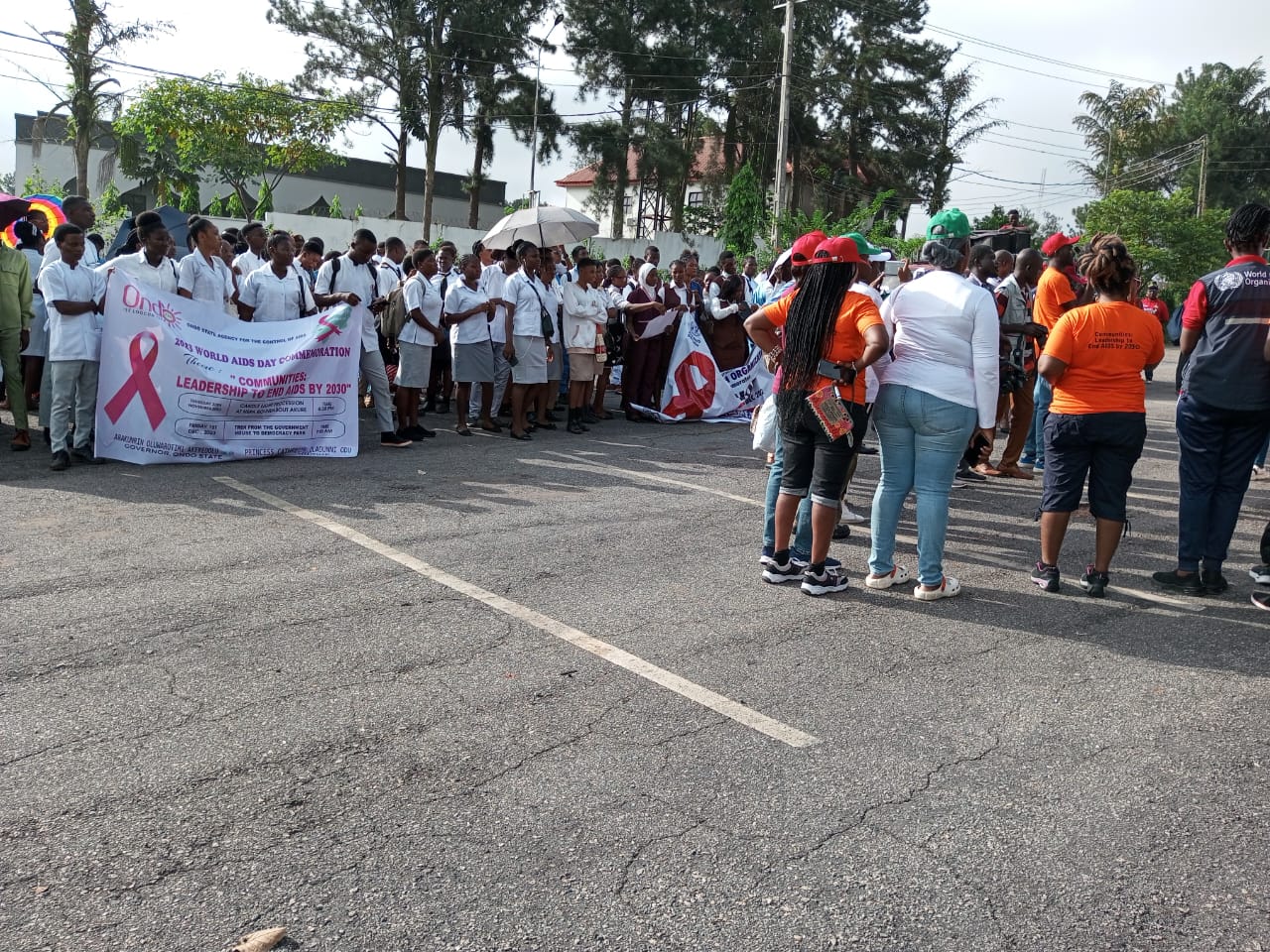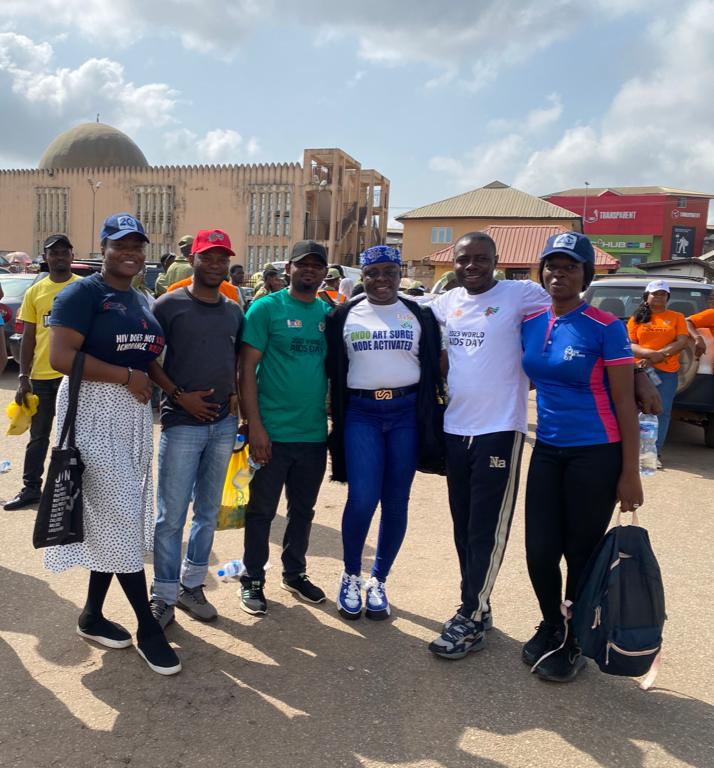World AIDS Day 2023: “Let communities lead”
Title: Uniting for Change: Mobilizing Collective Support to Combat HIV/AIDS in Nigeria
Today, December 1, marks World AIDS Day, a globally recognized day dedicated to raising awareness about HIV/AIDS and showing support for people living with the virus. On this significant day, it is crucial for us to reflect and renew our commitment to our response to the HIV/AIDS pandemic in Nigeria.
In the face of the ongoing global HIV/AIDS pandemic, it is crucial that we rally together to strengthen Nigeria’s response to this devastating disease. The burden of HIV/AIDS in Nigeria is significant, with prevalence rates varying across states. It behoves on us to critically examine the urgent need for collective support in Nigeria, with specific reference to the commitment statements made by Ekiti State and other leaders in the country.

Understanding the Challenge:
HIV/AIDS continues to pose a significant threat to public health and the well-being of individuals within Nigeria. According to UNAIDS, as of 2020, Nigeria had the second-highest number of people living with HIV globally, with approximately 1.7 million Nigerians affected by the virus.
Drawing inspiration from relevant literature, we can resonate with the words of Nelson Mandela who emphasized, “Overcoming poverty is not a gesture of charity. It is an act of justice.” Similarly, combating HIV/AIDS requires more than just sporadic efforts; it necessitates collective action, resilience, and an unwavering commitment from all sectors of society.
The world can end AIDS with communities leading the way, and this starts by empowering the communities to take the lead.
In light of this, to mark World AIDS Day here at Akure, K&TRC took part in the Flag-off Trek. This was organized by ODSACA, during the trek, passersby were sensitized about HIV and AIDS.

Leaders in Ekiti State and Nigeria as a whole have demonstrated their commitment to addressing the HIV/AIDS crisis. For instance, during the 2016 World AIDS Day commemoration, the Ekiti State Governor, Ayo Fayose, at the time stated, “We must intensify our efforts to raise awareness, prevent new infections, and ensure access to comprehensive treatment and support for those affected.” Other past Governors and her first ladies also demonstrated political will inbthe collective fight against the pandemic.
Specifically, the First Lady of Ekiti State, Erelu Bisi Fayemi in 2019 reiterated the commitment of the state government towards reducing the transmission rate of HIV/AIDS in the state. In her words, “We remember our departed loved ones, celebrate our successes and achievements in combating the virus and we urge and push for our communities to make a difference by taking up HIV testing services, HIV prevention services, supporting the treatment of and caring for People Living with HIV as well as joining in the fight against Stigmatisation and discrimination against People Living with HIV. Dr. Kayode Fayemi led administration is committed to mobilizing political, financial and all necessary supports so that Ekiti can be among the states that can meet the global target of ending AIDS by the year 2030.” These commitments provide a foundation for future actions and reinforce the shared responsibility to combat HIV/AIDS.
As we commemorate World AIDS Day, let us remember the millions of lives affected by HIV/AIDS in Nigeria and around the world. It is an opportunity for us to stand in solidarity with those who are living with HIV. Let’s honor the memory of those who have lost their lives to this disease.
In this fight, we’ve attained some height, but there’s still greater heights to attain. It is a time for us to prioritize awareness, education, and the accessibility of comprehensive prevention, testing, and treatment services. We must ensure that no one is left behind in our efforts to eliminate HIV/AIDS as a public health threat.
Call to Action:
- Raise Awareness: Education and awareness play a vital role in HIV/AIDS prevention. Let’s prioritize comprehensive and accurate information about prevention methods, testing, and treatment options. By eradicating stigma and promoting a culture of openness, we eliminate fear of discrimination from individuals seeking testing and treatment.
- Strengthen Health Systems: Nigeria’s health systems need bolstering to ensure essential services. These services including HIV testing, counseling, and antiretroviral therapy (ART), are accessible to all. Investment in well-equipped healthcare facilities, trained healthcare professionals, and sustainable supply chains will help improve outcomes and reduce new infections.
- Collaboration and Partnerships: A multi-sectoral approach is key to addressing the complexity of HIV/AIDS. Governments, non-governmental organizations, civil society, private entities, and international partners should collaborate to pool resources, share knowledge, and coordinate efforts. By working together, we can achieve more significant impact and progress in combating the disease.
- Empowerment and Support: We must greatly support those affected by HIV/AIDS, with access to quality healthcare, counseling, and psychosocial support. Implementation of programs to empower vulnerable populations, such as women, young people, and key populations is vital. This enables them to actively participate in decision-making processes, ensuring inclusivity and equality.
Conclusion:
Nigeria’s fight against HIV/AIDS demands a collective effort driven by commitment, empathy, and innovative strategies. We must build on past commitments and realize that the battle against HIV/AIDS can only be won through unity. Let us stand together as a society and break the cycle of transmission. This will provide hope and a brighter future for all Nigerians affected by this epidemic. Together, we can achieve a Nigeria where HIV/AIDS is no longer a threat but a memory.
Let World AIDS Day serve as a reminder that the fight against HIV/AIDS requires a united front. Today, we call upon all stakeholders, including government agencies, civil society organizations, healthcare professionals, community leaders, and individuals, to join hands and intensify our efforts in combating HIV/AIDS.
Together, we can promote HIV/AIDS prevention, challenge stigma and discrimination, and expand access to life-saving treatment. Let us use this occasion to inspire hope, ignite change, and renew our commitment to achieving an HIV-free Nigeria.
Remember, the power to make a difference lies within each and every one of us. Together, we can defeat HIV/AIDS and build a future where no one is limited by this disease. This battle is a marathon, not a sprint. Let us sow the seeds of collective action today and reap a healthier, HIV-free Nigeria tomorrow.
Gbenga M. Adesunloro, Strategic Knowledge Manager, Kids & Teens Resource Centre
